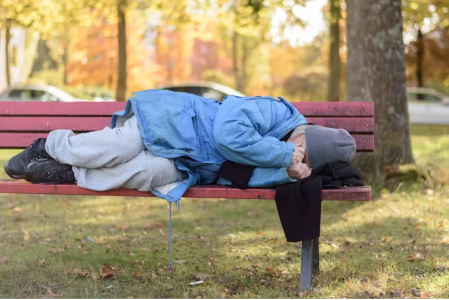Older Australians are also hurting from the housing crisis. Where are the election policies to help them?
- Replies 50
It would be impossible at this stage in the election campaign to be unaware that housing is a critical, potentially vote-changing, issue. But the suite of policies being proposed by the major parties largely focus on young, first home buyers.
What is glaringly noticeable is the lack of measures to improve availability and affordability for older people.
Modern older lives are diverse, yet older people have become too easily pigeonholed. No more so than in respect to property, where a perception has flourished that older people own more than their fair share of housing wealth.
While the value of housing has no doubt increased, home ownership rates among people reaching retirement age has actually declined since the mid-1990s.
Older people can also face rental stress and homelessness – with almost 20,000 homeless people in Australia aged over 55. Severe housing stress is a key contributing to those homelessness figures.
It’s easy to blame older Australians for causing, or exacerbating, the housing crisis. But doing so ignores the fact that right now, our housing system is badly failing many older people too.
No age limits
Owning a home has traditionally provided financial security for retirees, especially ones relying on the age pension. This is so much so, that home ownership is sometimes described as the “fourth pillar” of Australia’s retirement system.
But housing has become more expensive – to rent or buy – for everyone.
Falling rates of home ownership combined with carriage of mortgage debt into retirement, restricted access to shrinking stocks of social housing, and lack of housing affordability in the private rental market have a particular impact on older people.
Housing rethink
Housing policy for older Australians has mostly focused on age-specific options, such as retirement villages and aged care. Taking such a limited view excludes other potential solutions from across the broader housing system that should be considered.
Furthermore, not all older people want to live in a retirement village, and fewer than 5% of older people live in residential aged care.
During my Churchill Fellowship study exploring alternative, affordable models of housing for older people, I discovered three cultural themes that are stopping us from having a productive conversation about housing for older people.
Variety is key
A more flexible approach could deliver housing for older Australians that is more varied in design, cost and investment models.
The promises made so far by political parties to help younger home buyers are welcome. However, the housing system is a complex beast and there is no single quick fix solution.
First and foremost, a national housing and homelessness plan is required, which also involves the states and territories. The plan must include explicit consideration of housing options for older people.
Funding for housing developments needs to be more flexible in terms of public-private sector investment and direct government assistance that goes beyond first home buyer incentives.
International models
For inspiration, we could look to Denmark, which has developed numerous co-housing communities.
Co-housing models generally involve self-managing communities where residents have their own private, self-contained home, supported by communal facilities and spaces. They can be developed and designed by the owner or by a social housing provider. They can be age-specific or multi-generational.
Funding flexibility, planning and design are key to their success. Institutional investors include
Europe is also leading the way on social housing, where cultural attitudes are different from here.
In Vienna, Austria, more than 60% of residents live in 440,000 socially provided homes. These homes are available for a person’s entire life, with appropriate age-related modifications permitted if required.
At over 20% of the total housing stock, social housing is also a large sector in Denmark, where the state and municipalities support the construction of non-profit housing.
Overcoming stereotypes
Our population is ageing rapidly, and more older people are now renting or facing housing insecurity.
If policymakers continue to ignore their housing needs, even more older people will be at risk of living on the street, and as a result will suffer poor health and social isolation.
Overcoming stereotypes - such as the idea that all older people are wealthy homeowners - is key to building fairer, more inclusive solutions.
This isn’t just about older Australians. It’s about creating a housing system that works for everyone, at every stage of life.
This article is republished from The Conversation under a Creative Commons license. Read the original article.
What is glaringly noticeable is the lack of measures to improve availability and affordability for older people.
Modern older lives are diverse, yet older people have become too easily pigeonholed. No more so than in respect to property, where a perception has flourished that older people own more than their fair share of housing wealth.
While the value of housing has no doubt increased, home ownership rates among people reaching retirement age has actually declined since the mid-1990s.
Older people can also face rental stress and homelessness – with almost 20,000 homeless people in Australia aged over 55. Severe housing stress is a key contributing to those homelessness figures.
It’s easy to blame older Australians for causing, or exacerbating, the housing crisis. But doing so ignores the fact that right now, our housing system is badly failing many older people too.
No age limits
Owning a home has traditionally provided financial security for retirees, especially ones relying on the age pension. This is so much so, that home ownership is sometimes described as the “fourth pillar” of Australia’s retirement system.
But housing has become more expensive – to rent or buy – for everyone.
Falling rates of home ownership combined with carriage of mortgage debt into retirement, restricted access to shrinking stocks of social housing, and lack of housing affordability in the private rental market have a particular impact on older people.
Housing rethink
Housing policy for older Australians has mostly focused on age-specific options, such as retirement villages and aged care. Taking such a limited view excludes other potential solutions from across the broader housing system that should be considered.
Furthermore, not all older people want to live in a retirement village, and fewer than 5% of older people live in residential aged care.
During my Churchill Fellowship study exploring alternative, affordable models of housing for older people, I discovered three cultural themes that are stopping us from having a productive conversation about housing for older people.
- Australia’s tradition of home ownership undervalues renting and treats housing as a commodity, not a basic need. This disadvantages older renters and those on low income.
- There’s a stigma regarding welfare in Australia, which influences who is seen as “deserving” and shapes the policy responses.
- While widely encouraged, “ageing-in-place” means different things to different people. It can include formal facilities or the family home that needs modifications to make it habitable as someone ages.
Variety is key
A more flexible approach could deliver housing for older Australians that is more varied in design, cost and investment models.
The promises made so far by political parties to help younger home buyers are welcome. However, the housing system is a complex beast and there is no single quick fix solution.
First and foremost, a national housing and homelessness plan is required, which also involves the states and territories. The plan must include explicit consideration of housing options for older people.
Funding for housing developments needs to be more flexible in terms of public-private sector investment and direct government assistance that goes beyond first home buyer incentives.
International models
For inspiration, we could look to Denmark, which has developed numerous co-housing communities.
Co-housing models generally involve self-managing communities where residents have their own private, self-contained home, supported by communal facilities and spaces. They can be developed and designed by the owner or by a social housing provider. They can be age-specific or multi-generational.
Funding flexibility, planning and design are key to their success. Institutional investors include
- so-called impact investors, who seek social returns and often accept lower financial returns
- community housing providers
- member-based organisations, such as mutuals and co-operatives.
Europe is also leading the way on social housing, where cultural attitudes are different from here.
In Vienna, Austria, more than 60% of residents live in 440,000 socially provided homes. These homes are available for a person’s entire life, with appropriate age-related modifications permitted if required.
At over 20% of the total housing stock, social housing is also a large sector in Denmark, where the state and municipalities support the construction of non-profit housing.
Overcoming stereotypes
Our population is ageing rapidly, and more older people are now renting or facing housing insecurity.
If policymakers continue to ignore their housing needs, even more older people will be at risk of living on the street, and as a result will suffer poor health and social isolation.
Overcoming stereotypes - such as the idea that all older people are wealthy homeowners - is key to building fairer, more inclusive solutions.
This isn’t just about older Australians. It’s about creating a housing system that works for everyone, at every stage of life.
This article is republished from The Conversation under a Creative Commons license. Read the original article.









